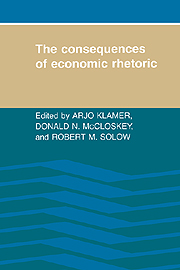Book contents
- Frontmatter
- Contents
- Preface
- The consequences of economic rhetoric
- PART I ECONOMIC RHETORIC: INTRODUCTION AND COMMENTS
- PART II ECONOMIC RHETORIC: FURTHER ARGUMENTS
- PART III ECONOMIC RHETORIC AMONG ECONOMISTS
- PART IV ECONOMIC RHETORIC IN POLITICS AND JOURNALISM
- 13 The heterogeneity of the economists' discourse: Philosopher, priest, and hired gun
- 14 The grammar of political economy
- 15 The rhetoric of economics as viewed by a student of politics
- 16 “Yellow rain” and “supply-side economics”: Some rhetoric that failed
- PART V ECONOMIC RHETORIC: ITS RHETORIC AND ITS CONSEQUENCES
- 1 Appendix: Other contributors and participants
- Index
14 - The grammar of political economy
Published online by Cambridge University Press: 07 September 2010
- Frontmatter
- Contents
- Preface
- The consequences of economic rhetoric
- PART I ECONOMIC RHETORIC: INTRODUCTION AND COMMENTS
- PART II ECONOMIC RHETORIC: FURTHER ARGUMENTS
- PART III ECONOMIC RHETORIC AMONG ECONOMISTS
- PART IV ECONOMIC RHETORIC IN POLITICS AND JOURNALISM
- 13 The heterogeneity of the economists' discourse: Philosopher, priest, and hired gun
- 14 The grammar of political economy
- 15 The rhetoric of economics as viewed by a student of politics
- 16 “Yellow rain” and “supply-side economics”: Some rhetoric that failed
- PART V ECONOMIC RHETORIC: ITS RHETORIC AND ITS CONSEQUENCES
- 1 Appendix: Other contributors and participants
- Index
Summary
This chapter explores the rhetoric of political debate about economic issues. Evidently, the art is thriving; seldom in history have madmen in authority distilled such frenzy from scribblers. Still, economists seem to devote little systematic thought to the politics of persuasion.
Rhetoric is a matter of language, and language is dual, a matter of transmission and of reception. Between economics and politics, transmission and reception must occur across a cultural divide. The rhetoric of political economy, of “economic discourse in the political arena,” is, linguistically speaking, a rhetoric of translation, of intercultural communication. To understand it properly you have to have a sense of nuance in both cultures.
One issue – not the primary topic of this chapter – concerns the tactics, the modes of expression, the idiosyncratic professional styles of economists themselves, their manner of comportment in the political arena, for example, in congressional hearings. Take the question of metaphor: What are the images that economists think legislators find persuasive?
On January 19, 1982, the Joint Economic Committee held a hearing of singular distinction. Three witnesses appeared: Professor Wassily W. Leontief of New York University, Nobel Laureate in Economics for 1973; Professor James Tobin of Yale, Nobel Laureate for 1981; and Professor Lawrence Klein of the University of Pennsylvania, Nobel Laureate for 1980. Professor Leontief testified first.
- Type
- Chapter
- Information
- The Consequences of Economic Rhetoric , pp. 221 - 239Publisher: Cambridge University PressPrint publication year: 1989
- 2
- Cited by

